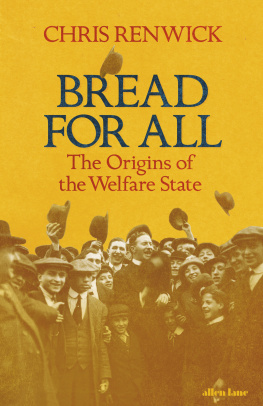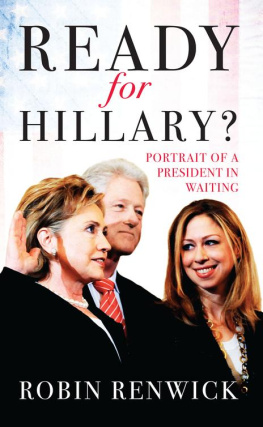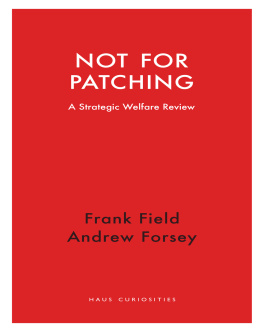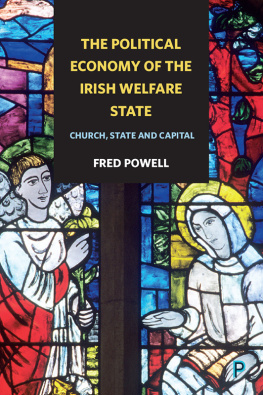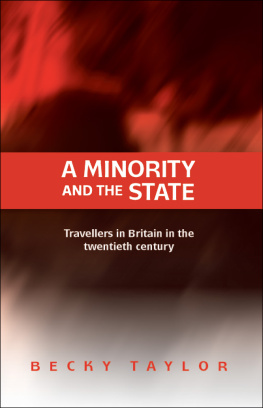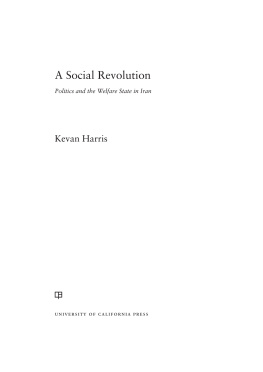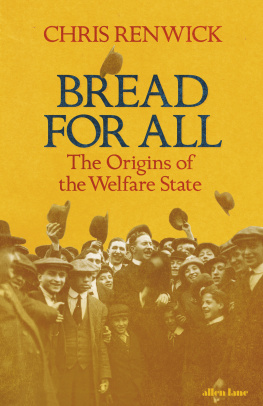Chris Renwick
BREAD FOR ALL
The Origins of the Welfare State
ALLEN LANE
UK | USA | Canada | Ireland | Australia
India | New Zealand | South Africa
Allen Lane is part of the Penguin Random House group of companies whose addresses can be found at global.penguinrandomhouse.com
First published 2017
Copyright Chris Renwick, 2017
The moral right of the author has been asserted
Front cover photograph: the Unionist Party candidate, Captain Browne, addressing a crowd of supporters during the Whitechapel by-election, London, 24 April 1913 Topical Press Agency/Getty
Cover design: Antonio Colao
ISBN: 978-0-241-18669-5
For Ivy
Introduction
A Very British Revolution
On the afternoon of Tuesday, 16 February 1943, William Beveridge a slightly built 64-year-old economist with a distinctive head of white hair parted on the left was sat in the gallery at Westminster listening to MPs, who were meeting in the House of Lords after Luftwaffe bombs had destroyed the Commons chamber nearly two years earlier. Back in the summer of 1941, Beveridge had made a nuisance of himself, criticizing the government when it had been struggling to make a breakthrough in the war with Germany, calling on it to let him play a bigger role in helping turn things round. Tired of his demands, the coalition government, led by Conservative Prime Minister Winston Churchill, had looked for ways to keep him out of sight and mind. A time-consuming and deeply involved investigation into Britains complex state-run insurance schemes, which covered almost 15 million people against short periods of unemployment and enabled nearly 5 million more to see a doctor when they were ill, seemed as good an answer as any. Now MPs had convened at Parliament to discuss the results a 299-page report called Social Insurance and Allied Services. While Beveridge had been compiling his report, things had changed. Lieutenant-General Montgomery had secured a major victory at El Alamein in Egypt in November 1942 and the war seemed to have turned in the Allies favour. But the government still wanted Beveridge to go away, along with his report.
In the report, Beveridge had outlined an ambitious and expensive system of social security, wrapped in a comprehensive policy of social progress, and told the public it was nothing less than they deserved for their wartime sacrifices. Judging by the half a million copies of the report that had been sold by the time of the parliamentary debate, the public agreed.
At around three oclock, a few hours into the debate, Beveridge left Parliament and headed two miles north, past St Jamess Park and through Soho, on his way to Manson House in Marylebone, where he was due to deliver a lecture entitled Eugenic Aspects of Childrens Allowances. Later in the twentieth century, any hint of an association with ideas of eugenics would be enough to terminate a political career. In the mid-1970s, the Conservative reformer Keith Joseph, one of Margaret Thatchers mentors, ran for the leadership of the Party: when he gave a speech warning that Britain would degenerate if something was not done about teenage mothers and other groups he suggested were a threat to British stock, his campaign promptly collapsed. In 1943, however, attitudes to eugenics were quite different. Beveridge, a man with deeply progressive ideas about society, was himself a fellow of the Eugenics Society and would join its consultative council after the war. But he also thought the idea of a welfare state that he had outlined in his report had eugenic implications albeit ones quite different from those that later concerned Joseph and believed they needed to be taken seriously by both government and society.
Beveridge was far from alone in having some kind of connection to either the Eugenics Society or the broad range of conversations on which it impinged. In the first half of the twentieth century, British people were fascinated by questions about fertility and what these questions meant for the countrys future. While the public digested scientific research that warned, plausibly (though with important caveats), that Britains population could dwindle to as few as 5 million within a century, social researchers inquired into peoples lives to find out why they seemed to want fewer children than their parents and grandparents. Mass-Observation, created in 1937 by the journalist Charles Madge and Tom Harrisson, an anthropologist, with help from the filmmaker Humphrey Jennings, aimed to access what Madge called the collective unconscious by documenting the kinds of ordinary voices that went unheard in most newspapers and magazines. Initially based in London and Bolton, Mass-Observation had upwards of a hundred active volunteers around the country who responded to surveys and kept diaries about life around them, which the organization then used as the basis for reports and books. By the early 1940s, attitudes to parenthood and families was a topic that had piqued Mass-Observations interest. They interviewed more than a thousand men and women in London and Gloucester, Britains metropole and a town thought typical of life beyond it, analysed hundreds of letters sent to family planning clinics and radio shows, and carried out observational studies of ordinary households, all in an effort to understand why British people, particularly middle-class people, were having smaller families than they had in the past. According to Mass-Observations report, Britain and Her Birthrate (1945), the situation was indicative of a deep and decades-old malaise that had been brought into focus by the war. People lacked
faith in the future. Not a belief that things are going to be tough, and it will take a long time to get right But a belief that nobodys going to try and put things right and improve them, that the nation is going to muddle on through the chaoses [sic] of another 191939 to another world war in 1965.
These concerns seemed to prove Beveridge right. People were likely to muddle through whatever happened, but when it came to big decisions, like whether or not to have a child, their behaviour was guided, often unconsciously, by whether they thought there was a light at the end of the tunnel. The plan Beveridge had presented to the government in late 1942, more than two months before Parliament was finally allowed to debate it, was ambitious. He promised it would end poverty in Britain and allow people to live with dignity, thanks to a system that would take care of them from the cradle to the grave as others, including Churchill, put it and all for a simple, flat-rate weekly payment from everyone who had a job. There were all kinds of questions about his proposals. Would there be enough jobs for everyone so they could pay the taxes that were required to make the scheme work? Would the benefits Beveridges system offered make some people lazy and complacent? Would there be families who expected everyone else to pick up the tab for the cost of raising their children (as the more reactionary members of the Eugenics Society argued)? But, as hundreds of thousands of copies of Social Insurance and Allied Services flew off His Majestys Stationery Offices printing presses, to be seen later in the hands of people in libraries and cafs, and on trains and buses, there was a sense that Beveridge had gone a long way to showing politicians what the country wanted.

